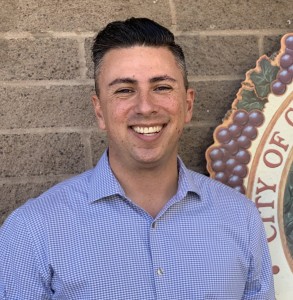1. You recently became the Assistant City Manager for the City of Carpinteria– Congratulations! What was your journey like to get to this public service position?
I’ve worked in local government for 22+ years, not including 4 years of volunteer service. I started my career in recreation and most recently served as Recreation Supervisor for the City of Moorpark. Although I worked in recreation, I always looked for ways to add to my toolbox, taking on stretch assignments, attending trainings, and investing in myself through books, online resources, and time with mentors. When I decided I wanted to transition to city management, I took bigger steps, including participation in the Ventura County Leadership Academy and enrollment in the Cal Lu MPPA program. With three daughters and long work days, it wasn’t easy, but I was persistent, taking one class a term, slow and steady.
2. For those unfamiliar with the role of City Managers, or how the Assistant City Manager supports the City Manager, could you take a moment to explain what your responsibilities are and how it fits in the scheme of municipal leadership?
There are different forms of municipal government. The type I’ve always been a part of is council-manager. In this form, residents are at the top of the organizational chart. They elect a council who then hire a City Manager to manage day-to-day operations and ensure that council priorities are successfully implemented. My role as the Assistant City Manager (ACM) is to assist in guiding this implementation. Currently, I oversee the Recreation, Parks, and Public Facilities Department, and several other council directives, including the development of a Racial Equity and Social Justice program, civic engagement program, and economic vitality efforts, to name a few.
3. How have your past professional experiences, including your time in the MPPA program, prepared you for this new career position?
My past professional experiences have prepared me for this position by providing me with experience, knowledge, and guidance. Fortunately, I knew what I wanted to do when I entered the MPPA program. This allowed me to tailor the program to my goals. The ability to research, analyze, and support my conclusions and recommendations is the most helpful skill I developed during my time at Cal Lu. In addition, the relationships I formed and the confidence I gained have been priceless. You won’t know everything but having confidence in your ability to learn and people to support you will set you on a trajectory for success.
4. From your time in this new capacity thus far, what have you found to be the greatest benefits and greatest challenges that public service leaders face today, either generally or specifically in the City of Carpinteria? What do you hope to contribute during your time with the City?
In local government, the rewards and challenges are often one and the same. We face a myriad of issues: affordable housing; public safety; diversity, equity, and inclusion (DEI); homelessness; and budget constraints, just to name a few. As a public service leader, the reward is that you can affect real change in these areas, right in your own community. What I hope to bring to Carpinteria is a leadership style that emphasizes community engagement, supports strategic planning, and strengthens relationships amongst City staff, residents, and community stakeholders. Ultimately, trust is the foundation of progress, and I want to help my organization build trust everywhere I can.
5. Before closing, do you have any suggestions or inside tips for those in the MPPA community who are also interested in a similar line of work?
Absolutely. Here are my top 5!
- Take Drew Powers and P.J. Gagajena’s classes as soon as possible. As active (and highly regarded) City Managers in the field, their knowledge and guidance will be invaluable.
- Most, if not all, professors in the MPPA program will allow you some leeway in selecting papers and/or project topics. If possible, select topics that center on approaches to city management and/or current local government challenges.
- Find a mentor, or two.
- Watch as many city council meetings as you can and familiarize yourself with the various elements (e.g., City staff reports, public hearings, etc.).
- Join at least one city managers professional association and utilize their training, resources, and networking opportunities (e.g., International City/County Managers Association – ICMA, Municipal Management Association of Southern California – MMASC.).
Good luck!
From everyone in the MPPA program, we wish you the best in your new capacity and thank you for your time in answering these questions!

